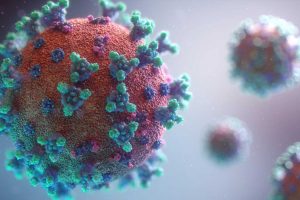Researchers identify remdesivir-resistant variant of SARS-CoV-2 virus in immunocompromised patient


A team of scientists at the Yale Schools of Medicine and Public Health has identified a remdesivir-resistant variant of SARS-CoV-2, the virus that causes COVID-19, in an immunocompromised patient who was being treated with the widely used antiviral agent.
The researchers said the discovery raises concerns about the emergence of drug resistance in COVID-19 patients, particularly those who are immunocompromised.
“Because of their immunocompromised state, these individuals may be reliant on therapy alone to help clear the virus as they do not have the assistance of an immune response,” said Yale School of Medicine Clinical Fellow Dr. Shiv Gandhi, M.D., Ph.D., the study’s first author. “As a result, they may be more prone to developing resistance to that therapy, whether it be to a small molecule like remdesivir or to an antibody therapy.”
In their report, the researchers said the 70-year-old patient’s clinical symptoms initially improved with treatment, including reduction of her fevers. But the patient’s viral load rebounded and increased while she was being treated with remdesivir. Searching for a cause for the change, the researchers found that the virus’s replication enzyme, nsp12, had mutated, making it resistant to remdesivir therapy. The patient’s infection was eventually cleared with a treatment of casirivimab and imdevimab, a combination monoclonal antibody therapy.
The findings highlight the need to monitor for the development of SARS-CoV-2 resistance to small molecule antiviral treatments such as remdesivir.
“The threat of antiviral resistance is a critical concern, given the rate that the virus introduces mutations in the genome,” said the study’s senior author Dr. Albert Ko, M.D., the Raj and Indra Nooyi Professor of Public Health and Professor of Epidemiology (Microbial Diseases) at the Yale School of Public Health. “A big question is whether this will happen with the other drugs, paxlovid and molnupiravir, we are using to treat our patients.”
The current findings are limited to the use of remdesivir in an immunocompromised patient and the extent of resistance risk involving other antiviral agents remains unclear, the researchers said.
“Immunocompromised patients may be a source of novel genetic variation. We believe that they should be closely monitored before, during, and after therapy for the emergence of resistance,” Gandhi explained. “At Yale, we have increased the number of patients who undergo sequencing of their virus to more proactively identify novel SARS-CoV-2 variants.”
The researchers note that the patient in their study had previously received treatment for Stage IV Non-Hodgkin’s Lymphoma and was in remission at the time she was diagnosed with COVID-19. She battled the SARS-CoV-2 infection without needing supplemental oxygen for nearly six months, a particularly long period of time that allowed the virus to mutate, replicate, and spread, the researchers said. The fact that the patient was not very sick despite six months of viral replication suggests that the pathology from the virus comes from an overexuberant immune response, which the patient lacked, Gandhi said.
Combination therapy, which appears to have successfully limited treatment resistance in the immunocompromised patient in the study, reduces the risk of a virus becoming resistant to a single therapy, the research said. Such treatments, which use multiple agents targeting different parts of a virus, have been previously successful in treating patients with HIV.
Source: Read Full Article